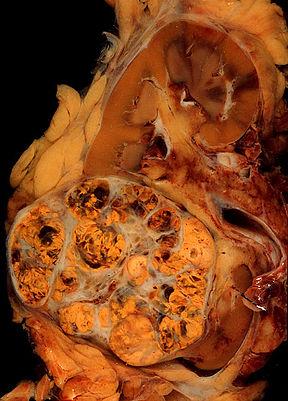Sechenov University together with their German colleagues suggest a new highly sensitive, quick, and pain-free method for diagnosing kidney cancer.

Credit: Ed Uthman/Wikimedia Commons
Sechenov University together with their German colleagues suggest a new highly sensitive, quick, and pain-free method for diagnosing kidney cancer. This method is based on measuring of the immune response to arrestin-1, a retina protein that is synthesized in the cancerous cells of kidneys.
Tumors can be benign or malignant. The first ones are not extremely dangerous but they can evolve into the latter ones, and those, in turn, are a cause of every sixth death in the world. Around 90-93% of all kidney growths turn out to be malignant, and there are currently no effective methods for early diagnostics. The initial stages of kidney cancer have no signs or specific symptoms, and therefore patients often get diagnosed with kidney cancer when it has already metastasized. At this point, the doctors make prognosis not about the possibility of recovery, but about a patient’s life expectancy.
Cancerous cells are the cells with considerable deviations in their behavior, such as abnormal division, development, or protein synthesis. Proteins may be synthesized in wrong quantities, in a wrong place, or they may be of a poor quality. Normally arrestin-1 is synthesized in the eye retina only, and its occurrence in another body organ may cause intensive autoimmune response (i.e. a reaction against the body’s own proteins). It’s already been discovered that arrestin-1 is present in melanoma (malignant skin tumor). However, the idea to check the kidney tumor cells for this type of protein and to measure the intensity of the immune response to it turned out to be new for the scientific world.
The scientists wanted to find out whether it is possible to use the antibodies to arrestin-1 as well as the protein itself as a marker of cancerous kidney diseases. To do so, they dyed tissue sections, carried out blood tests, and sequenced the samples. The samples for the experiment were collected from patients that suffered from malignant and benign kidney growths. The antibodies to arrestin-1 were found in the blood serum of 75% of the patients; the protein itself was identified in 90% of benign tumors and in over 50% of cancerous ones. Increased levels of arrestin-1 were also noticed in metastasis, especially in the brain metastasis.
All subtypes of kidney tumors synthesize arrestin-1, which makes this method inefficient for differential diagnostics. However, due to its high sensitivity to benign growths, the method helps diagnose a disease on early stages when the chances for recovery are at the highest. The diagnostic procedure is reduced to simple blood test for the antibodies to arrestin-1 instead of a biopsy that is technically complicated and painful for a patient. “The discovery of arrestin-1 synthesis in cases of kidney cancer suggests the possibility of developing anti-cancer vaccines on the basis of this protein in the near future,” says Andrey Zamyatnin, a co-author of the work, and the head of the Institute of Molecular Medicine at Sechenov University.
###
The research was carried out by Sechenov University, a Project 5-100 participant, together with scientists from the Medical and Genetic Scientific Center, Ludwig Maximilian University of Munich, the Belozersky Institute of Physico-Chemical Biology at Lomonosov Moscow State University, the National Medical Research Center of Radiology, and the Institute of Bioorganic Chemistry of the Russian Academy of Sciences.
This research supported by the Russian Science Foundation (RSF) grant 15-15-00100 will be published in the February issue of the Biochimie journal
Media Contact
Nataliya Rusanova
[email protected]
Original Source
https:/
Related Journal Article
http://dx.




